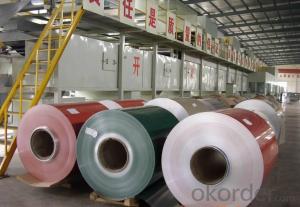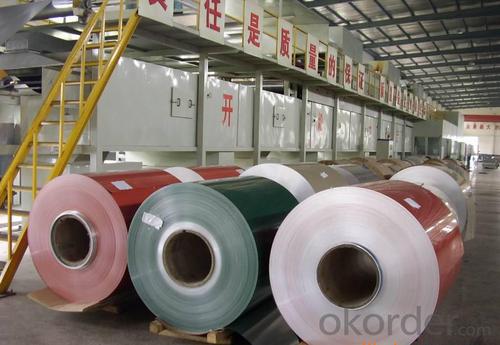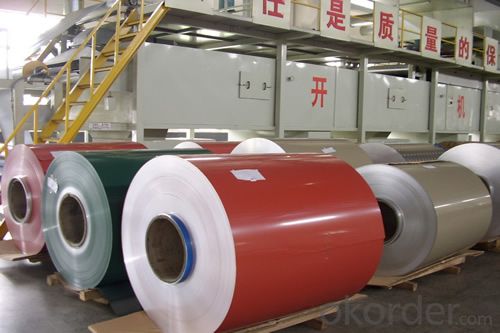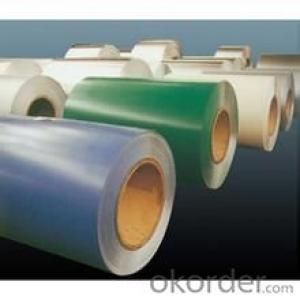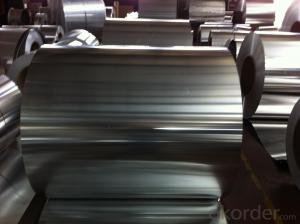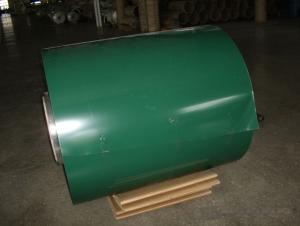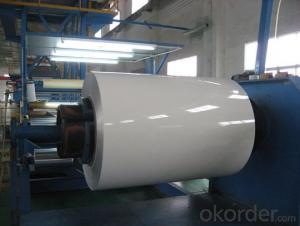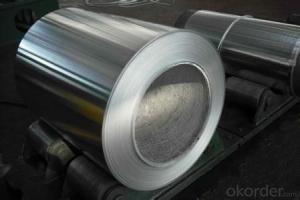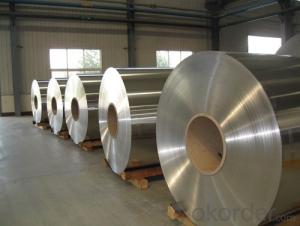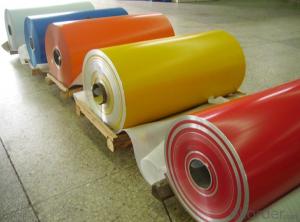Aluminum Coil Saufit Alloy 1100 PVDF Aluminum Roll for Roofing/Ceiling/Gutter/Decoration
- Loading Port:
- Tianjin
- Payment Terms:
- TT OR LC
- Min Order Qty:
- 5 m.t.
- Supply Capability:
- 50000 m.t./month
OKorder Service Pledge
OKorder Financial Service
You Might Also Like
Specification
Alloy 1100 PVDF Aluminium Roll for Roofing/Ceiling/Gutter/Decoration
Specification
Grade
| 1000 Series: 1050 1060 1070 1100 1200 1235 etc. 3000 Series: 3003 3004 3005 3104 3105 3A21 etc. 5000 Series: 5005 5052 5083 5086 5154 5182 5251 5754 etc. 6000 Series: 6061 6063 6082 6A02 etc. 8000 Series: 8006 8011 8079 etc. |
Thickness | 0.05~10mm |
Width | <1600mm< span=""> |
Color | Metallic, Solid, RAL or by customer requirements |
Coating paint: | PVDF(Polyvinylidene Fluoride), PE(Polyester ) |
Coating thickness | as per customer’s request |
Gloss | 10-90%(EN ISO-2813:1994) |
Total coating thick | Polyester18~25micron(EN ISO-2360:1995) PVDF25 ~35micron(EN ISO-2360:1995) |
Coating hardness | 2H |
Protective film | PVC film, Colorless transparent or White-black |
Adhesion | 5B (EN ISO-2409:1994) |
Impact resistance | No cracking and peeling (A.S.T.M D2794-1993) |
Flexibility (T-bend) | 0T- 2T |
Temper | H16, H18, H24, H26, H26 |
Certification | ISO9001:2000, CE, SGS |
Coil's standard diameter | 1100mm |
Inner Diameter | 405mm/505mm |
Coil's standard weight | 2000kgs |
Payment | L/C ,T/T |
Packing
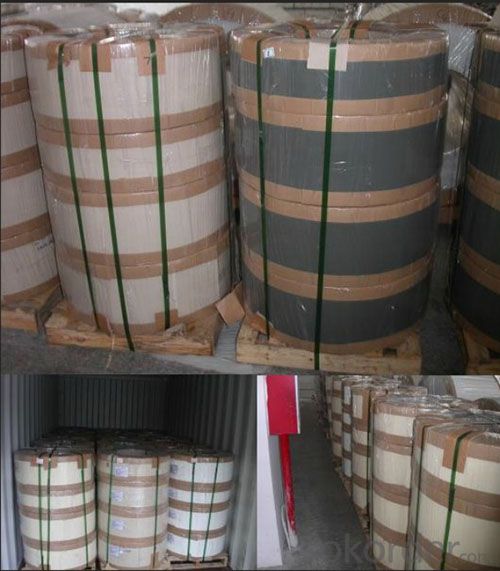
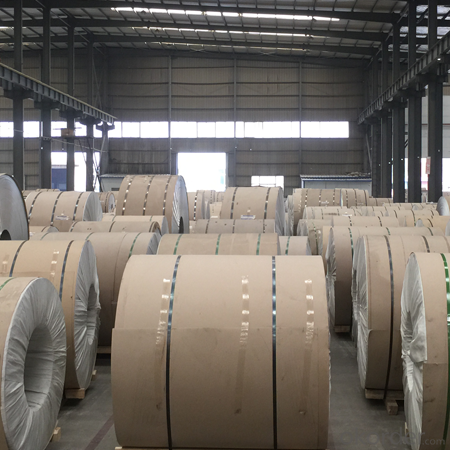
FAQ
Q: How can I request a product sample? A: The samples are free but freight should be collected. Please send sample list and courier account number by email.
Q: How can I request a product catalog? A: The hard copies of catalogs are free but freight should be collected. Please send courier account number by email. You are suggested to request a PDF catalog.
Q: Wha's your payment terms? A: One is T/T 30% before production and 70% against copy of B/L; the other is Irrevocable L/C 100% at sight.
Q: What's your trade terms? A: FOB, CNF(CFR), CIF, EXW.
Q: How long is the quality guarantee? A: All of our products have a period of quality guarantee since time of shipment. Please contact your salesman for more details, as different products enjoy different time of guarantee
- Q: What are the different slitting options for aluminum coils?
- There are several slitting options available for aluminum coils, including shear slitting, rotary slitting, and razor slitting. Shear slitting involves using upper and lower blades to cut through the coil, resulting in straight edges. Rotary slitting uses circular blades that rotate at high speeds to slice through the coil, offering fast and efficient slitting. Razor slitting, on the other hand, utilizes sharp blades to make precise cuts in the aluminum coil. The choice of slitting option depends on the desired outcome and specific requirements of the application.
- Q: What is the shelf life of aluminum coils?
- The shelf life of aluminum coils can vary depending on various factors such as storage conditions, protective coatings, and exposure to environmental elements. However, in general, aluminum coils can have a shelf life of several years if stored properly in a dry, cool, and non-corrosive environment.
- Q: What are the width tolerances for aluminum coils?
- The width tolerances for aluminum coils vary depending on the specific grade and type of coil. However, typical width tolerances for aluminum coils range from +/- 0.005 to 0.020 inches.
- Q: Is it possible to utilize steel wires in the creation of jewelry or decorative items?
- <p>Yes, you can use steel wires for making jewelry or decorations. Steel wires are durable and can be shaped into various forms, making them suitable for a range of designs. They are often used in wire wrapping techniques and can be combined with beads or other materials. However, it's important to consider the type of steel used; stainless steel is more resistant to rust and is commonly preferred for jewelry making. Additionally, steel wires may require special tools for cutting and bending, and proper safety measures should be taken during the crafting process.</p>
- Q: Are aluminum coils suitable for architectural cladding?
- Yes, aluminum coils are suitable for architectural cladding. Aluminum is a lightweight and durable material that offers excellent corrosion resistance, making it ideal for exterior applications such as cladding. Additionally, aluminum coils can be easily formed and fabricated into various shapes and sizes, providing designers with flexibility in creating unique architectural designs.
- Q: I'm having trouble with another chem problemAluminum sulfide reacts w/water to form aluminum hydroxide and hydrogen sulfide. Write the balanced chemical equation for this reaction and find how many grams of aluminum hydroxide are obtained from 14.2 g of aluminum sulfide.I already found the balanced equation but I need help on finding how many grams of aluminum hydroxide are obtained from 14.2 g of aluminum sulfide. Can someone please explain how it's done?
- You use the given grams of Aluminum Sulfide, and use stoichiometry. First convert the Aluminum Sulfide from grams to moles [14.2g (1 mole of Aluminum Sulfide/total mass of Aluminum sulfide)]. Then, set up a mole ratio of Aluminum Sulfide to Aluminum Hydroxide (you do this by creating a ratio of the coefficients of both Aluminum Sulfide and Aluminum Hydroxide from your balanced equation; moles of Aluminum Hydroxide/miles of Aluminum Sulfide). And then finally convert back to grams (total mass of Aluminum Hydroxide/ 1 mole of Aluminum Hydroxide). In total, it should look like this: [14.2(1 mol Al Sulfide/mass of Al Sulfide)(mols of Al Hydroxide/mols of Al Sulfide)(mass of Al Hydroxide/1 mol of Al Hydroxide)]
- Q: What is the corrosion resistance of aluminum coils?
- Aluminum coils have excellent corrosion resistance due to the formation of a protective oxide layer on their surface. This oxide layer acts as a barrier, preventing further corrosion and making aluminum coils highly resistant to various environmental conditions and corrosive elements.
- Q: Can aluminum coils be used for gutter systems?
- Indeed, gutter systems can employ aluminum coils. The lightweight property, durability, and resistance to rust and corrosion make aluminum a favored material for gutters. It is common practice to utilize aluminum coils to shape seamless gutters, which present benefits such as reduced leakage and an enhanced visual appeal. Moreover, maintaining aluminum gutters is effortless, and they can be painted to harmonize with a building's exterior. All in all, aluminum coils are a fitting and frequently employed option for gutter systems.
- Q: How is Aluminum formed??Thanks!!
- I don't think any significant quantity of aluminum is produced by reduction with carbon - aluminum is too reactive for this to give a good yield. Instead, the metal is produced by electrolysis in the Hall-Heroult process. First, aluminum ore is processed to aluminum oxide in the Bayer process. This ore, bauxite, consists of aluminum oxides and hydroxides with some impurities, mostly iron oxides. The aluminum oxide/hydroxides are dissolved with concentrated sodium hydroxide in water. Iron oxides and hydroxides do not dissolve, and are filtered out. AlOOH (insoluble in water) + NaOH + H2O ----- NaAl(OH)4 (soluble in water) Neutralizing or cooling this solution will cause aluminum hydroxide to precipitate out. This is then heated strongly to drive off water and produce aluminum oxide. 2Al(OH)3 ----- Al2O3 + 3H2O This aluminum oxide can be melted and then electrolyzed to make the metal and oxygen gas. However, the melting point of aluminum oxide is very high, so it is dissolved in molten cryolite (Na3AlF6), which has a lower melting point. This is then electrolyzed, and molten aluminum collects at the bottom of the cell (cathode), where it can be drawn off. Because the oxygen that would be formed will attack most metal electrodes, a sacrificial carbon electrode is used for the anode and is oxidized to CO2. Very small amounts of aluminum metal occur in nature - it is usually found in association with fossil fuel deposits (which provide the reduced carbon necessary to reduce aluminum minerals).
- Q: What are the weight considerations when using aluminum coils?
- When using aluminum coils, there are several weight considerations to take into account. Firstly, aluminum coils are generally lighter in weight compared to other metals, such as steel. This makes them a popular choice in industries where weight reduction is a priority, such as automotive manufacturing or aerospace applications. The lightweight nature of aluminum coils allows for improved fuel efficiency in vehicles and increased payload capacity in airplanes. Secondly, the weight of the aluminum coil itself is important to consider. Depending on the specific application, the weight of the coil may need to be within certain limits to ensure proper functioning and structural integrity. For example, in HVAC systems, the weight of the aluminum coil needs to be suitable for the unit to be mounted securely and able to withstand vibrations or pressure changes. Additionally, the weight of the aluminum coil can impact transportation and installation. Lighter coils are easier to handle, transport, and install, reducing the time and effort required for these processes. This can be particularly advantageous in construction projects where large quantities of aluminum coils are used. It is also crucial to consider the weight-bearing capacity of the structures or equipment that will be supporting or utilizing the aluminum coils. The weight of the coils, combined with any additional components or materials, should not exceed the load capacity of the system to avoid structural failure or safety hazards. Lastly, the weight of aluminum coils can affect cost considerations. Since aluminum is typically priced based on weight, lighter coils may be more cost-effective compared to heavier alternatives. However, it is important to strike a balance between weight reduction and meeting the required performance and strength specifications. In conclusion, weight considerations when using aluminum coils encompass factors such as the overall weight reduction benefits, the weight of the coil itself, transportation and installation ease, load-bearing capacity, and cost implications. Taking these considerations into account ensures the successful and efficient utilization of aluminum coils in various industries and applications.
Send your message to us
Aluminum Coil Saufit Alloy 1100 PVDF Aluminum Roll for Roofing/Ceiling/Gutter/Decoration
- Loading Port:
- Tianjin
- Payment Terms:
- TT OR LC
- Min Order Qty:
- 5 m.t.
- Supply Capability:
- 50000 m.t./month
OKorder Service Pledge
OKorder Financial Service
Similar products
Hot products
Hot Searches
Related keywords
